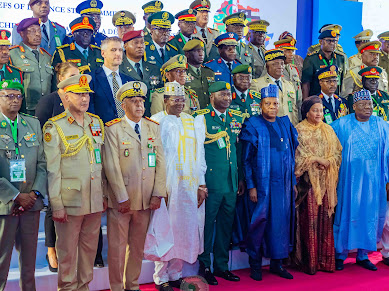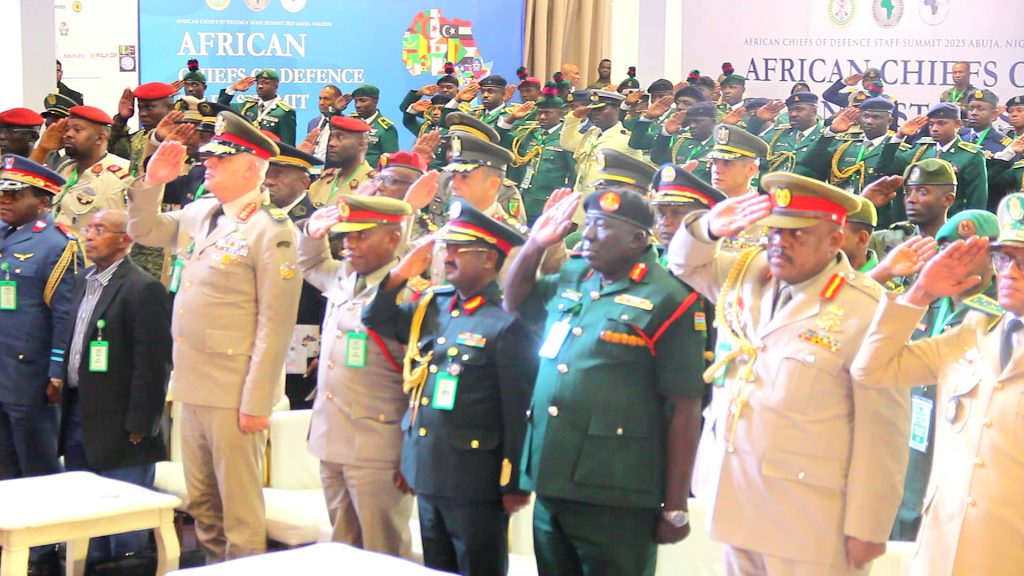By Sumaila Ogbaje, News Agency of Nigeria (NAN)
The maiden African Chiefs of Defence Staff Summit, held in Abuja from Aug. 25 to Aug. 27, sent a clarion call to African leaders.

The call reinforces the imperative of trusted home-grown solutions to enable Africa to decisively confront insurgency, terrorism and organised crime that continue to blight communities from the Sahel to the Gulf of Guinea.
The three-day gathering, which brought together defence chiefs, industry players and policy experts from more than 50 countries, reignited the push for African-led doctrines, indigenous defence production and deeper military-industry collaboration.
In charting an African course, Nigeria’s Chief of Defence Staff and host of the summit, Gen. Christopher Musa, captured the spirit of the deliberations in his welcome remarks.

Musa told the delegates that the summit was convened to map out a strategy for Afrocentric solutions to the continent’s security challenges.
According to him, unity of purpose and locally tailored strategies will produce durable gains foreign solutions often fail to secure.
He warned that African nations could not afford to remain over-dependent on imported strategies and tools.
“While national boundaries set countries apart, a common future demands joint efforts to ensure stability and growth across Africa.
“The reality is that our challenges are within us, and it is only within us that we will create the solutions.”
The CDS emphasised that collaboration must move beyond rhetoric to practical steps: harmonising doctrine, building interoperable capabilities, and investing in industries that can supply the continent’s unique operational needs.
While declaring the summit opened, President Bola Tinubu, represented by Vice-President Kashim Shettima, urged a fundamental rethink of Africa’s defence architecture.
Tinubu proposed the establishment of a permanent African Chiefs of Defence Staff Forum–a platform for continuous dialogue, strategic foresight, and cooperation that ensures African doctrine, procurement and training were consistent with African needs.
He cautioned that reliance on external suppliers for critical equipment often led to misalignment between what was procured and what was actually needed in the field.
For him, sustainable security required not only tactical coordination but also an industrial base rooted in African soil.
In his submission, Nigeria’s Minister of State for Defence, Bello Matawalle, said that future of warfare was digital and unpredictable.
He said that African security must be driven by African solutions, leadership and unity.
The UN Deputy Secretary-General, Amina Mohammed, in a goodwill message, echoed the same emphasis, saying the role of strategic defence collaboration was critical in combatting contemporary threats.
According to her, such collaboration must be rooted in partnerships that recognise local agency and ownership.
Dr Omar Alieu Touray, President of the ECOWAS Commission, represented by Ambassador Abdel-Fatau Musah, stressed that no region in Africa was spared from the scourge of insecurity, and that cooperation was not just desirable but existential.
He said the summit aligned with Nigeria’s continental security vision– that regional cooperation was central to tackling insecurity.
Specific ECOWAS concerns included the Sahel region, which was noted to account for a high proportion of conflict-related deaths in Africa at 51 per cent in 2024.
On his part, Prof. Ibrahim Gambari, former Nigerian Minister of External Affairs and ex-Permanent Representative to the UN, warned that there were more than 1,000 terrorist groups operating across Africa, describing the trend as a serious threat.
Gambari emphasised that countries needed to secure themselves first, then regions, and finally the continent.
He urged African nations to strengthen their defence industries, develop indigenous technologies, and design a home-grown security architecture that guaranted human security.
Gambari’s position is in tandem with the call for self-reliance in security: indigenous manufacturing, local technologies, and ownership of defence capability.
Security analysts say these interventions reinforce the summit’s central thesis that Africa cannot outsource its peace.
The summit’s communique underlined this pragmatic turn as it committed member states to harmonise intelligence-sharing mechanisms; prioritise logistics and sustainment in capability planning; incentivise intra-African defence procurement; and create regional centres of excellence for training, maintenance and research.
Analysts agree that these were not abstract goals but direct responses to recurring problems such as imported hardware lying idle for want of spares, troops slowed by weak supply chains, and doctrines mismatched with local realities.
For African defence industries, the summit also marked a watershed.
On the sidelines, Mr Kola Balogun, Secretary-General of the Defence Industries Association of Nigeria (DIAN), said that government patronage of local defence manufacturers was no longer optional.
According to Balogun, when governments buy home-made defence equipment, they are investing not just in hardware but in human security.
He described the Abuja summit as “a turning point for local industry that had long sought entry into regional defence markets”.
Balogun argued that sustained procurement of Nigerian and African products would stimulate jobs, keep young people productively engaged, and “shrink the recruitment pool for violent extremist groups”.
The defence industry player added that continuity in government policy was vital; stressing that successive political and military leadership must ensure consistency in public-private partnerships so that local firms can plan, scale and deliver reliably.
Three pragmatic reasons stood out across the discussions and the communique: first, that Africa’s battlespaces vary from the deserts of the Sahel to coastal waters plagued by piracy.
Therefore, locally developed doctrines and equipment are likelier to match these realities than off-the-shelf imports designed for other theatres.
The panelists also believed that local production would shorten supply chains, lower lifecycle costs and improve availability of spares and maintenance support.
They also agreed that defence procurement, if localised, would become a tool for industrialisation, creating jobs, transfers skills and provide alternatives to insurgent recruitment.
Yet, candid admissions of difficulty were not absent.
Many African suppliers remain small and fragmented, with limited access to finance and certification hurdles.
Procurement frameworks still tilt toward foreign contractors. Concerns about governance and transparency persist.
The communique therefore recommended pooled procurement mechanisms, regional certification standards, and seed financing through development banks to help local firms scale.
According to Musa in his closing remarks, this summit is only a beginning.
He said the challenge was translate shared vision into practical reforms.
The Abuja Summit closed with a promise to move from rhetoric to reform.
The speeches, the communique, and the industry interventions all underscored one truth: Africa cannot secure itself without trusting itself.
Security observers say for that promise to be kept, defence chiefs, heads of state, and industry must convert commitments into budgets, procurement plans and regional agreements.
They say only then will the saying “African solutions to African problems” shift from slogan to reality–delivering security, livelihoods and dignity to communities long denied peace. (NANFeatures)
***If used, please credit the writer and the News Agency of Nigeria
